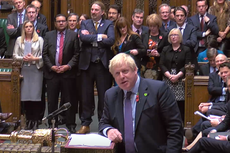Forget the early polls – it will be Labour coming in from the cold in this winter election
With families struggling to make ends meet as they knock on doors in the run up to Christmas, Labour will be thinking: game on

For the first time since 1923, Britain is heading for a December general election. After what felt like an eternity of posturing and dithering from all sides, Labour leader Jeremy Corbyn made the decisive move to back a 12 December ballot.
With Boris Johnson taking the clear lead in early opinion polls, there have been predictions of electoral doom for Corbyn’s Labour. So gloomy are those predictions, in fact, that many of his own MPs were reluctant to support an election at all. But despite the current state of the polls, there are still reasons for optimism on the left.
The most experienced watchers of polling trends are already stating that it is unlikely that either the Tories or Labour will win a majority in this election. Expert pollster John Curtice – famous for predicting the shock 2017 election result – told LBC Radio this week: “There are going to be a record number of non-Conservative and non-Labour MPs as a result of this election. That makes it difficult for the Tories and Labour to win an overall majority.”
It's very possible that Labour and the Tories will win almost the same amount of seats in this election, give or take a few. As Curtice also points out, in the case where neither party wins a majority, Jeremy Corbyn is in a better position to pitch and deal with others in the chamber: a confidence and supply agreement with the SNP and/or the Liberal Democrats could put him in Number 10 at the head of minority prime minister within days. Boris Johnson, however, has to win that Conservative majority or do a "deal with the devil" with Nigel Farage and his emerging Brexit Party – an agreement that would lose Johnson much of his long fought for control over the British right.
But why does the Labour Party stand to gain a small number of seats?
If we look at the last two elections, it was Conservatives who benefited from the collapse of other parties. In 2015, the backlash against the Liberal Democrats gifted them a slim majority. Now the Lib Dems are back, their past failures forgotten by a new generation of students and celebrated for their pro-EU message that will be enticing to many Tory Remainers, as seen by the number of defections in recent weeks. On the list of 60 Lib Dem target seats for the next election, 48 are currently held by Conservatives and just nine are held by Labour. Under the first past the post voting system, the Lib Dems pose a far bigger threat to the Tories.
In 2017, the Ukip collapse helped the Tories cling on to power, but now that the Halloween deadline for Britain leaving the EU has been extended until 31 January – something the prime minister vowed he would "die in a ditch" before he allowed to happen – the Brexit Party will likely resurge among hard Brexiteers. Even if Farage’s party achieves a modest rise to 15 per cent, this will take vital votes from the Tories and undo the gains of 2017.
Steve Baker, the deputy head of the European Research Group, and who previously claimed that the Tories could not win an election without a pact with Farage’s party, ruled out such a collaboration yesterday. With a majority of just 6,000, Baker’s seat could be vulnerable if the Tories lose votes to hardcore no-dealers and angry Remainers, allowing Labour to challenge him without necessarily gaining many votes.
In this election, many voters will consider Brexit the most pressing issue. The new Tory slogan of “Get Brexit done” recognises this. But where the Tories need to hurt Labour, in the north east, the Brexit Party stands a good chance of eating into the Tory vote. In more affluent areas, the Lib Dems might manage the same. In Labour strongholds such as London, they still stand little chance of flipping seats, with majorities standing at 30,000 votes or more.
With voters still polarised, the electoral map isn’t as prosperous as it might appear – whatever the early national polls say.
If the Tories want to focus on Brexit, it’s because they know that Labour has the potential to dominate the debate if this election is allowed to become about mainstream domestic issues such as the NHS or the housing crisis. Beyond Brexit (and even before it) there is real anger at the state of the country. When Labour managed to refocus the 2017 election on these issues, rather than Brexit or Theresa May’s “strong and stable leadership”, the party defied the early odds to deprive the Tories of a working majority in the house.
A repeat of 2017, where Labour erased a 20-point Tory lead in a few short weeks, is more than possible if the Tory campaign fails to inspire this time around.
And it looks like they know it. Yesterday Financial Times Whitehall correspondent Sebastian Payne, told his Twitter followers that one Tory MP had told him the impending election was "like a can of paint. Once it's open, it's going to splatter everywhere. No one really knows how it's going to turn out."
To be clear, Labour still faces enormous obstacles in this election.
Since 2017, poll after poll has exposed Corbyn’s abysmal personal approval rating. He is trusted neither by hardcore Remainers or Brexiteers, and his handling of antisemitism allegations within the party has perhaps irreversibly damaged Labour's reputation.
On the doorstep, Corbyn is reviled by the many who feel that, when they’ve most needed him to form a vocal and ambitious Opposition, he hasn’t stepped up to the challenge. But we already know that, in campaign mode, Corbyn is a different person to the man he seems to be as leader of the Opposition.
Like it or not, the next prime minister will either be Boris Johnson or Jeremy Corbyn (who will likely need to be propped up by Nicola Sturgeon). Corbyn will be hoping that, when looking at the dire state of public services or the climate emergency, people will hold their noses and decide that he is the lesser of two evils. His MPs will also hope that Labour’s nebulous Brexit stance, which now advocates for a Final Say referendum, will be enough to stop the Remainer exodus that occurred in the European elections in May, while still appealing to Leavers who are angry about austerity.
History is not on the Tories’ side: no ruling party has ever won a December election. Labour has been on an “election footing” for two years, with an impressively coordinated ground game driven by mass people power. Yes, lots of people think Corbyn is toxic – but vast numbers of the British electorate feel alienated by Boris Johnson and the Conservatives too.
In this cold winter election, with families struggling to make ends meet and homeless people freezing to death on Britain’s streets, Labour will be thinking: game on. There's every likelihood that Corbyn could be about to defy the polls yet again.



Join our commenting forum
Join thought-provoking conversations, follow other Independent readers and see their replies